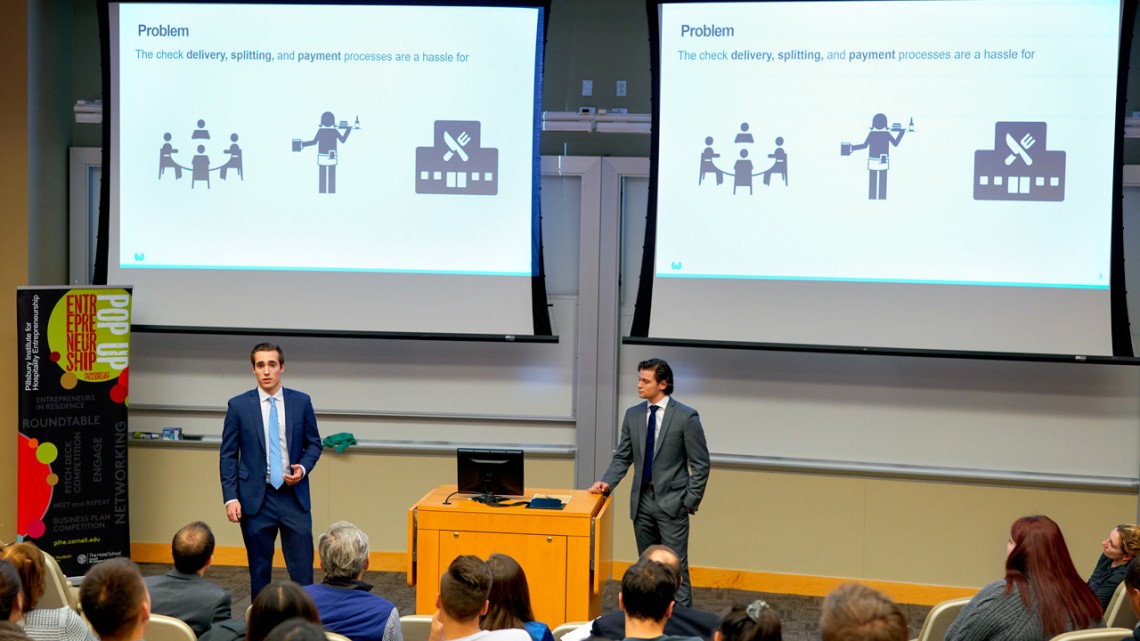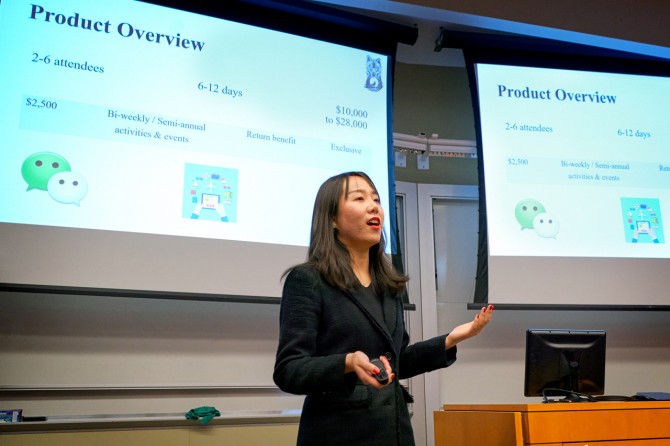
Joe Davolio ’20, left, and Justin Goldstein ’21 pitch WAY, a technology startup that aims to improve the process of paying at restaurants. The pair won the $3,000 grand prize at the fourth annual Cornell Hospitality Pitch Deck Competition, hosted Nov. 19 at the School of Hotel Administration and sponsored by the Pillsbury Institute for Hospitality Entrepreneurship.
Pitch competition rewards new ‘way’ to pay restaurants
By James Dean
Ever struggled to get a waiter’s attention when you’re ready to pay for your meal? Or paid more than your fair share when splitting a check with a group of diners?
“Checks are bad,” Joe Davolio ’20 said during the fourth annual Cornell Hospitality Pitch Deck Competition, hosted Nov. 19 by the School of Hotel Administration and sponsored by the Leland C. and Mary M. Pillsbury Institute for Hospitality Entrepreneurship. “Every step of this process costs every player involved time and money.”
A trio of alumni judges awarded Davolio and Justin Goldstein ’21 the competition’s $3,000 grand prize for their skillful pitch of WAY, a proposed mobile technology platform that would eliminate the hassle of restaurant checks.
WAY would allow customers to choose and pay for the items they ordered directly from their phones, after scanning a QR code on the table. Restaurants could clear tables faster and pay lower transaction fees than typically charged by credit card companies. Groups could easily split checks without complicated negotiations, using multiple credit cards or having to reimburse each other through peer-to-peer apps like Venmo.
“No more pain in selecting exactly what was yours for your fair share,” said Goldstein.
The business pitch by Davolio, a senior in the School of Industrial and Labor Relations, and Goldstein, a junior in the Hotel School, was “incredibly smooth,” said judge Meli James ’00, co-founder of Hawaii-based Mana Up and president of the Hawaii Venture Capital Association.
“Not only how they presented, but their slides were really clear, and they had a really compelling message that was succinct,” she said.
Those communication elements were the primary focus of the competition, said its faculty chair, Andrew Quagliata, a Hotel School lecturer.
“Communication skills are essential for entrepreneurs,” he said. “This competition really does value good ideas, but we also at its core designed the experience to allow teams to practice these communication skills in a variety of ways.”
The competition began with 13 teams submitting “reading pitch decks” in October. A panel of six hospitality industry judges evaluated those documents and winnowed the field to four finalists.
In Statler Hall on Nov. 19, each finalist had 10 minutes to present 11 slides to a public audience, followed by a five-minute Q&A with the judges, who also included Warren Leeds ’84, co-founder of Dartcor Food Services, and Danny Stein ’92, managing partner of Volery Capital Partners.
Judges peppered the teams with questions about operational details; market research; potential customers and partners; and how they might scale up their businesses.
They awarded the $1,500 second-place prize to Shucen “Susan” Ding, MMH ’20, for Silver Moon, a travel service that would target a growing demographic of senior Chinese singles.
“It’s absolutely out of my comfort zone, because English is not my native language,” Ding said of the experience. “I’m happy I made the decision to compete.”
James credited Ding with pitching a novel idea backed by helpful information about market trends, and a poised presentation and thoughtful responses to questions.
“Her stats made sense, looking at that growing Chinese market and the growing elderly market,” James said.
Winning third place and $500 was Suna Breakfast, a company that delivers breakfast to students, pitched by Pedro Bobrow ’20 and Max Child ’20.
Fourth place went to Deven Girgenti ’20 and Luke Verzella ’23 for Alfred Complete, a proposed hotel concierge application.
Team WAY, meanwhile, is assembling an engineering team and plans to begin testing its technology over the winter. Davolio and Goldstein said the pitch deck presentations had affirmed the value of communicating their idea well.
“We’re really excited about the problem we’re solving and the solution that we have for it,” said Goldstein, “and what’s really important in getting that out to the public is communicating it the right way.”
“It’s an opaque [market] space that we’re in, so communication between one another and with others definitely helps with clarity of thought and, in turn, strategy,” added Davolio.
Like some of their pitch deck rivals, the team now looks forward to the Pillsbury Institute-sponsored Cornell Hospitality Business Plan Competition at Statler Auditorium on March 14, 2020, where teams will compete for prizes totaling more than $35,000.
Media Contact
Get Cornell news delivered right to your inbox.
Subscribe

